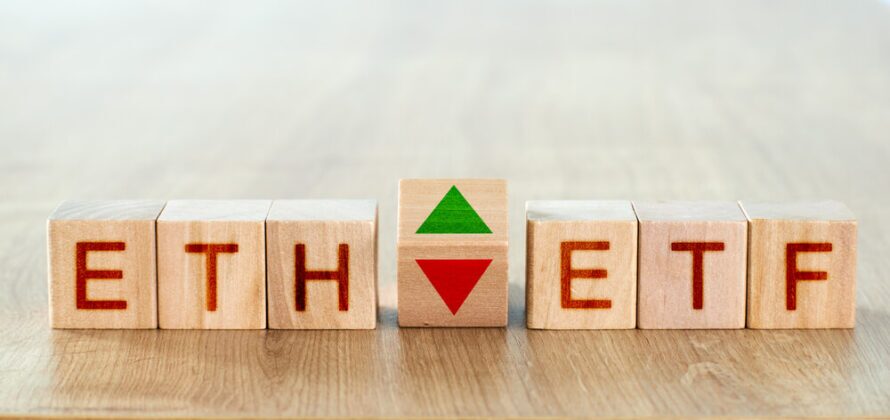Spot Ethereum ETF is Approved by US SEC, can we celebrate now?
Spot Ethereum ETFs may take a while before they can start trading as only one of two conditions have been fulfilled by the issuing parties of the ETFs.


Notorious for being distrustful to the blockchain industry, the US Securities and Exchange Commission has approved spot Ethereum ETFs on 23 May. The most optimistic among us crypto investors may even anticipate the approval for spot XRP ETFs, maybe even SOL ETFs, ADA ETFs, and so on.
Is it time to jump the hype train (or rocket) and shout “ETH to the Moon” yet?
It could be months before ETF trading even starts
The week of the ETF approval was marked with a 27% bullish rally in the ETH market as retail investors bought in without hesitation.
In reality, the “supply crunch” that ETH holders are hoping for may be a long shot. The supply crunch could prop up ETH’s price in the same way as Bitcoin, when institutional investors were buying BTC ETFs in droves, effectively decreasing the supply of Bitcoin in the market.
To be precise, the SEC had only approved the 19b-4 filings from several US stock exchanges (e.g. NYSE and Nasdaq) to list potential Ethereum ETF products in the future. This is only one of two filings that needs approval before ETH ETFs can start trading.
The other filing is called the S-1 registration statement, which is what the actual issuers (e.g. VanEck, Grayscale, Fidelity) of the ETFs must submit before offering Ethereum ETFs to the market.
SEC could take extra time to approve Ethereum ETF trading
While both Bitcoin and Ethereum ETFs are philosophically the same products, which enable investors to gain exposure to Bitcoin or Ethereum without the pain of self-custody, the SEC just don’t see it that way.
The SEC has been more cautious with Ethereum due to ongoing debates about whether ETH is a security or a commodity.
How ETH is viewed by one US government agency won’t significantly impact its price performance, but it could impact how it is regulated in the US, and how soon ETH ETFs can begin trading.
This has led to additional scrutiny and amendments in the filings. For instance, the 19b-4 filings for Ethereum ETFs have included specific language around staking, explicitly stating that the ETFs will not engage in staking activities. This is a notable difference from Bitcoin ETFs, which do not have this stipulation.
Does it even matter if ETH is labelled a ‘security’?
If someone issues a security, the SEC demands that the issuing party provide strict disclosure and reporting about the underlying assets that are being represented by the security.
Certain aspects of Ethereum make it seem like it’s security to the eyes of the SEC. Ethereum’s initial fundraising through an initial coin offering (ICO) in 2014 is a significant factor. During the ICO, investors purchased ETH with the expectation of future profits.

Even an implicit expectation of profit (from a price appreciation for owning an asset) is enough reason for the SEC to classify that asset as a security.
Ethereum’s network receives significantly more updates than Bitcoin, and happens through voting of those who staked ETH. In this particular way, ETH then acts as a measure of voting ability in similar ways to how company shareholders vote.
If ETH is classified as a security, it would subject Ethereum and any investment products tied to it, like spot ETFs, to stricter regulations under the SEC’s purview. This would involve a more rigorous application process for spot Ethereum ETFs, potentially leading to delays and higher costs for issuers.
Existing applications for spot Ethereum ETFs might be disqualified if the SEC determines that Ethereum falls under their definition of a security.
Issuers would likely need to revise their applications to comply with the new regulatory requirements, causing delays and potentially forcing them to resubmit their proposals.
To this day, the SEC has not yet classified Ethereum as a security.
Why did spot Bitcoin ETFs get approved more easily?
The approval of Bitcoin ETFs early this year seemed like a breeze, and for a good reason. The U.S. Commodity Futures Trading Commission (CFTC) has already classified Bitcoin as a commodity, and that has largely been uncontested. The CFTC focused on Bitcoin’s use as a store of value and medium of exchange without centralised control.
An ETF that contains commodities is generally less scrutinised by the SEC. Commodities often derive their value from market supply and demand. For example, gold, crude oil, and wheat are tradable commodities, and macroeconomic factors are what drive these commodities’ prices. Commodities are also produced out of something that has nothing to do with itself.
Bitcoin has been hailed as a commodity because Bitcoin doesn’t require Bitcoin to make more of. It is mined using computers and electricity.
There was also no way to produce more Bitcoin out of the whim of an organisation. Bitcoin must be mined, and not even the founder or the network of miners could simply will more Bitcoin to exist.
Ethereum’s main weakness in terms of arguing against the SEC’s “security” label is that about 72 million ETH was issued at Genesis.
Out of the initial supply of 72 million ETH, 50 million ETH was sold in the ICO, generating about $18 million in BTC for the Ethereum Foundation. The Foundation had kept the remaining 12 million ETH and allocated a portion of that to the early contributors.
Shortly after the ICO, the Foundation had at least $4.3 million worth of ETH on top of the $18 million raised.
This is an incredible amount of money, considering that ETH was created out of thin air, without much effort even from Ethereum’s early Proof of Work system, in very similar ways that company shares are issued.
Of course, this freaked out the SEC, as their main goal is to protect investors. In the earlier days of Ethereum, the SEC’s primary concerns were to prevent the sole actions of the Ethereum Foundation to do financial harm on ETH holders, such as rugpulling or market manipulation.
Will there be more crypto ETFs in the U.S.?
As an altcoin, Ethereum looks more decentralised than ever. The market effects from Ethereum’s founders can be eliminated due to the great diversity of ETH holders across the world.
People still buy Ethereum with the hope of profiting off of it one day. They do that either by staking ETH and earning validator rewards, or by depositing it into a liquidity pool whilst holding on to it.
Just like commodities, ETH now has far more utility than simply being a speculative instrument. But the crypto market, being its natural self, will always speculate. It’s up to the SEC now to sharpen its definition of what a security or a commodity is.
For crypto assets, they must establish a standard for when a crypto asset is becoming like a commodity, perhaps such as by looking at its age, utility, and decentralisation.
If that doesn’t happen, the market will adapt to a securities-based crypto ETF. Either way, the macrotrend is clear — institutions are taking larger and larger slices of the crypto market.
Further reading: Explore more topics on all things crypto.
Share to
Stay curious and informed
Your info will be handled according to our Privacy Policy.
Make sure to follow our Twitter, Instagram, and YouTube channel to stay up-to-date with Easy Crypto!
Also, don’t forget to subscribe to our monthly newsletter to have the latest crypto insights, news, and updates delivered to our inbox.
Disclaimer: Information is current as at the date of publication. This is general information only and is not intended to be advice. Crypto is volatile, carries risk and the value can go up and down. Past performance is not an indicator of future returns. Please do your own research.
Last updated June 5, 2024





